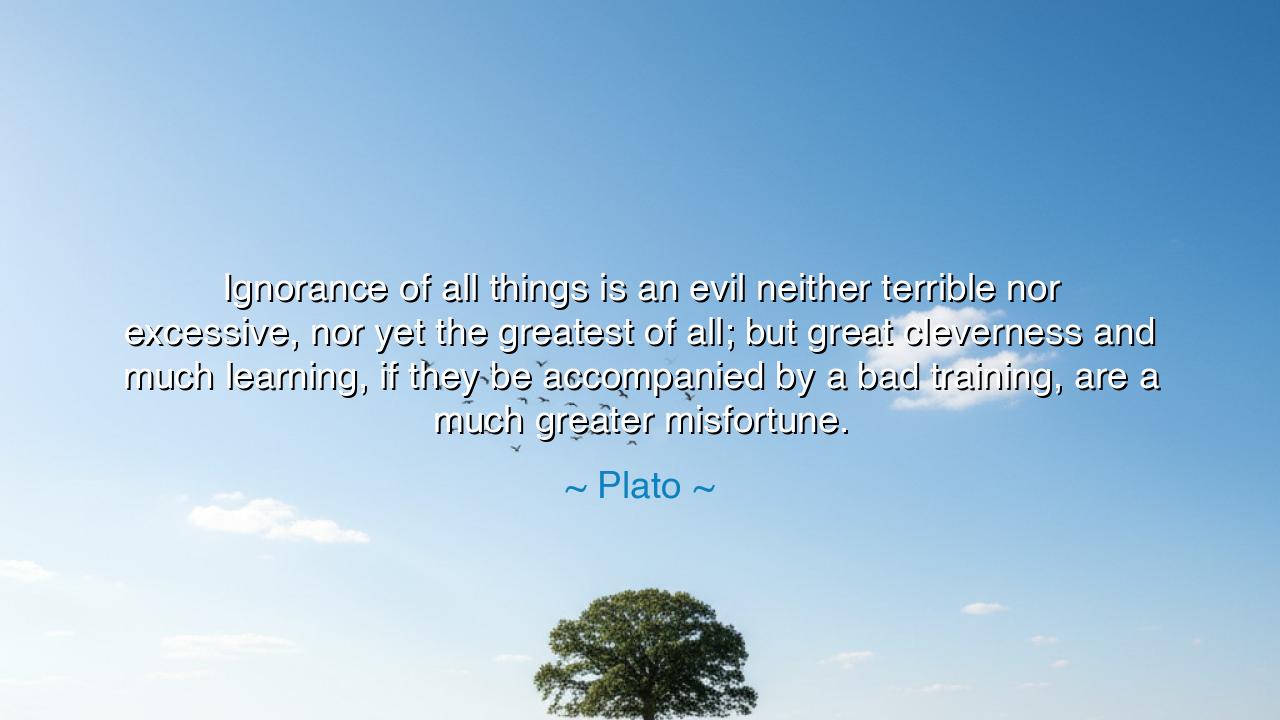
Ignorance of all things is an evil neither terrible nor
Ignorance of all things is an evil neither terrible nor excessive, nor yet the greatest of all; but great cleverness and much learning, if they be accompanied by a bad training, are a much greater misfortune.






“Ignorance of all things is an evil neither terrible nor excessive, nor yet the greatest of all; but great cleverness and much learning, if they be accompanied by a bad training, are a much greater misfortune.” — Plato
From the ancient mind of Plato, philosopher of Athens and disciple of Socrates, comes this warning both profound and prophetic. In this saying, he lifts the veil from a truth that has echoed through all ages: that knowledge without virtue is more dangerous than ignorance itself. He teaches that ignorance, though a kind of darkness, can still be illuminated by truth; but corrupted wisdom, born of pride or moral decay, is a flame that consumes rather than enlightens. For when the mind is filled with knowledge but the soul remains untrained, intelligence becomes not a blessing but a weapon—one that wounds both the self and the world.
The origin of these words lies in Plato’s reflections on the nature of education and the soul, likely drawn from the dialogues of The Republic and Protagoras, where he explores the relationship between knowledge, virtue, and justice. To Plato, the aim of true education was not the mere accumulation of facts, but the formation of character—the alignment of reason, spirit, and desire in harmony with the good. He saw that men who possess great intellect but lack moral grounding become tyrants, deceivers, or destroyers. They may dazzle others with cleverness, but their brilliance serves only to magnify their faults. Thus, Plato declares that the untrained intellect is a peril, for it multiplies the power of vice.
History bears witness to this truth. Consider Alcibiades, the brilliant Athenian statesman and student of Socrates himself. Gifted with wit, eloquence, and strategy, he possessed every quality that could have made him great. Yet, unrestrained by virtue, his cleverness turned to manipulation, his ambition to betrayal. He shifted loyalties between Athens, Sparta, and Persia, serving only his vanity. In the end, his genius wrought chaos upon the very city that raised him. His tragedy is the embodiment of Plato’s warning: that cleverness without conscience leads not to greatness but to ruin.
Plato contrasts this with ignorance—not to glorify it, but to show that it is less dangerous, for it lacks the power to destroy. The ignorant man may stumble in error, but the corrupted scholar leads others astray. Ignorance can be cured by teaching; arrogance masquerading as wisdom cannot. The humble unlearned man may still be open to truth, while the proud intellectual, convinced of his own superiority, shuts his ears to the good. Thus, a poorly trained mind, filled with knowledge but devoid of humility, becomes like a poisoned spring—its waters may seem pure, but they bring death to those who drink.
There is also in Plato’s words a reflection of divine proportion: knowledge and virtue must grow together, as the roots and branches of the same tree. To separate them is to invite collapse. Knowledge gives power, but virtue gives direction; one without the other is blind strength. The truly wise, therefore, seek not only to know, but to become good. For wisdom is not what one learns, but how one lives. As the ancients said, “It is not he who knows many things who is wise, but he who knows what is useful and right.”
This truth has never ceased to be relevant. In every generation, there are those who wield technology, influence, and intellect without conscience—who mistake cunning for wisdom and ambition for greatness. Yet even now, Plato’s voice calls through the centuries: let education be not only of the mind, but of the heart. Let every school, every home, every soul remember that learning must be guided by moral training. The purpose of knowledge is not domination, but enlightenment; not conquest, but compassion.
The lesson, then, is both warning and promise. Cultivate your knowledge, but temper it with virtue. Sharpen your intellect, but bind it to justice. Seek truth, but let humility be your guide. For wisdom is a fire—if governed, it gives warmth and light; if unrestrained, it consumes. Let your learning serve goodness, your cleverness serve humanity, and your power serve peace. In this harmony lies the essence of what Plato called arete—the excellence of the soul.
And so, remember, O seeker of wisdom: ignorance may be a shadow, but knowledge without virtue is the storm. Walk not with the proud who know everything but understand nothing. Walk with the humble who learn to live rightly, who join understanding with goodness, and whose brilliance illuminates rather than blinds. For only when the mind is wise and the heart is pure can knowledge become not a curse, but a blessing to the world.






AAdministratorAdministrator
Welcome, honored guests. Please leave a comment, we will respond soon